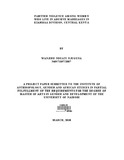| dc.description.abstract | The purpose of this study was to investigate partner violence among women who live in abusive marriages in Kiambaa Division. Specifically, it examined the perceptions of women toward partner violence, the causes and forms of partner violence experienced by ever married women and men aged 21 to 55 years. The study administered a cross-sectional survey questionnaire to 54 ever married men and women. The method of data collection included key-informant interviews and interviewer administered questionnaire.
The findings indicate that Kiambaa women tend to perceive use of aggression by intimate partner as justifiable and a normal way of life. There were notable relationships between various perceptions of domestic violence and the actual experiences with domestic violence. The findings also show that there are fewer males than females who perceive partner violence as a normal way of life. The study also found that there are females who support wife battering partly due to cultural acceptance of abuse by husbands as normative behaviour.
Economic factors were found to account for more cases of partner violence, than structural/cultural factors. Although the study aimed at investigating partner violence among women who live in abusive marriages, study findings indicate that female perpetrated abuse against the males was equally high. Women perpetrators of intimate partner violence cause more incapacitation to their victims than the male perpetrators. In addition to economic and structural/cultural causes, several other factors account for partner violence, but no single factor explains the phenomenon of partner violence. Alcoholism, jealousy of partner, notdoing housework properly, extra-marital relations, resistance to sexual advances and poor communication, all play the role of triggers to violence in marital relationships. Although not overtly reported, there were arguments about unmet sexual needs and reports of undesired marital intercourse.
Reported forms of violence within marriage were classified into three subheads: physical, economic and psycho-social. The most common and frequently used forms of physical violence reported were slaps and blows, hitting with a stick, pushing, kicking, throwing objects, and sexual coercion or assault. Physical violence during lifetime was found to be higher among respondents who experienced divorce, were currently married, those with secondary education attainment, with lower levels of autonomy in decision making related to household, and among all religious population.
Economic form of violence is usually triggered by verbal exchanges with demands for money. The most commonly reported forms of economic violence were deprivation of access to funds for basic needs, withholding money, expecting her to run a house on a minimal amount, keeping resources - both monetary and material beyond a respondent's reach, snatching away her money, not allowing her to work, forcing her to source for support from her birth home, giving her no power in deciding where and how to use the money. The most commonly described forms of psychosocial violence were withdrawal from normal interactions, unconstructive criticism, threats, insults, belittling comments, manipulation and isolation.
This form of violence was reported in equal proportions by both females and males, regardless of social and educational status. No single form of violence takes place in isolation and the highest reported forms of violence were those that combined all three major forms and they took place simultaneously. Based on the findings, it is recommended that legal aid and advice be made available to victims of partner violence and a media strategy for bringing a massive awareness and education on the issue of gender be planned. The government should develop, enlarge and strengthen social support services programmes for victims of domestic violence, irrespective of gender. The government should carry out the implementation of comprehensive strategies addressing domestic- violence that are sensitive to the needs and safety of the victims and hold offenders accountable for their crimes. | en_US |

